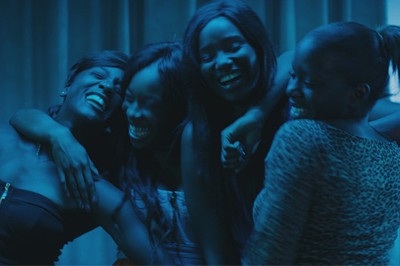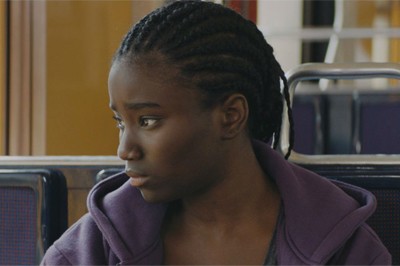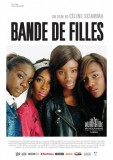| Reviews & Columns |
|
Reviews DVD TV on DVD Blu-ray 4K UHD International DVDs In Theaters Reviews by Studio Video Games Features Collector Series DVDs Easter Egg Database Interviews DVD Talk Radio Feature Articles Columns Anime Talk DVD Savant Horror DVDs The M.O.D. Squad Art House HD Talk Silent DVD
|
DVD Talk Forum |
|
|
| Resources |
|
DVD Price Search Customer Service #'s RCE Info Links |
|
Columns
|
|
|
Girlhood (Bande de Filles) [AFI Fest 2014]
Strand Releasing // Unrated // January 30, 2015
List Price: Unknown [Buy now and save at Fandango]

Richard Linklater's Boyhood received some of the most hype out of any other film in 2014. It serves as a nostalgia trip that truly captures many of the rites of passage that we experience when growing up in American society. While it's a great piece of cinema, it hardly explores many of the more personal hardships that one must overcome through adolescence. Writer/director Céline Sciamma's festival favorite Girlhood might fool some into thinking it's somehow related to Linklater's picture, but it's an entirely different feature. Largely ignoring many of the external factors of growing up, Sciamma highlights the emotional battles that we have within ourselves, as well as the struggle centered around the concept of morality. How do "right" and "wrong" apply to adolescence, and how do they affect our future?
Marieme (Karidja Touré) lives within a difficult family structure, as she primarily takes care of her two younger sisters. She fears her older brother, Djibril (Cyril Mendy), and his abusive tendencies. Their father is absent, while their mother is constantly working. After dropping out of school, she joins a group of three free-spirited girls, led by Lady (Assa Sylla). She pursues a similar lifestyle in order to find both the freedom as well as the identity that will free her from under the oppressive rule of both her brother and the expectations of society.
The crowds that we spend time around as a young adult truly affect the outcome of our personalities as we continue to grow up. In Marieme's case, she wants to blend in with three popular girls, who she begins spending an abundant amount of time with. While first appearing as an outsider, she progressively becomes more like the group as time continues. However, her status within the group isn't truly recognized until she receives a necklace from Lady with the word "Vic" on it, which is short for "Victory." This is a strong motif that follows Marieme through her journey in growing up. She puts many of her responsibilities on the back burner in order to spend more time with this group, in which she feels a part of. Sciamma's screenplay has numerous subtle nuances that truly work to the picture's advantage. When Marieme briefly meets a previous member of her clique, she slowly begins to realize that her place within this group very well may be nothing more than a stepping stone towards a greater future. Her place amongst the "cool kids" will not last forever, and she realizes that if she wants to go anywhere in this world, she needs to do something with her life.
Girlhood is cut into several chapters, which are separated by a paused black screen before moving into the next set of sequences. Sciamma perfectly captures the phases that so many individuals endure throughout adolescence. Each one of these sections are influenced by previous occurrences that continue to shape her path to adulthood. One of the major elements to this coming-of-age story is society's construction of gender. There is most certainly an oppressive patriarch at work in many of Marieme's relationships. This is heavily represented through the fear of her older brother, the social pressures of the popular boys, and the dominating presence of a future employer. Our lead plays football in the opening scene and is later found playing sports video games. Many of her activities are viewed as being male-driven, as she continues to contradict gender stereotypes. The fights with other girl gangs are certainly provoked by the talk of male peers, as Lady and Marieme are willing to do whatever it takes in order to keep a good reputation. Girlhood proves to be so much more than a film about growing up, but is also about a girl's struggle to overcome the patriarchal aspects of her community.
The more that Marieme battles with her identity, the further we're plunged into this epic journey. Completely reflective of reality, Sciamma has crafted an intense roller coaster of a film with some true high points that will be difficult to forget. One of which features a singing and dancing sequence to Rihanna's "Diamonds," which inevitably becomes the feminist anthem of the film in the most brilliant way possible. There are several defining moments in this picture that are sure to resonate with all audiences by the time the credits are rolling, regardless of your gender, race, or place of origin. From the first scene to the final sequence, Girlhood explores themes and feelings that exceed superficial expectations that we've come to have for the genre. The conclusion, in particular, is so utterly human and sincere, that we can't help but truly feel with our lead. If this story was told from any other filmmaker, it could have easily turned into a "pity piece. However, writer/director Céline Sciamma makes us feel with Marieme, rather than for her, and that's truly a powerful thing.
Girlhood may be her feature debut, but Karidja Touré is absolutely mesmerizing as Merieme. This is a tremendously inspiring portrayal that perfectly captures the young adult, who is fighting to find her identity. She does an impeccable job in delivering an authentic character that will truly resonate with audiences on a personal level. Also new to the acting career, Assa Sylla is masterful as Lady. She successfully delivers a tough exterior to her personality, but manages to perfectly transition to the genuine core that Lady possesses. There isn't a single weak link here, but Touré and Sylla truly leave an impression that can be increasingly difficult to shake off.
Writer/director Céline Sciamma has done more than craft a wonderfully written screenplay, but she has delivered a tremendously effective atmosphere along with it. The feature is captured in an intimate fashion, as we constantly feel as if we're within the mind of Merieme, and everything else is external. A variety of changing hues are applied throughout the running time in order to set a tone, which successfully utilizes an evolving color palette. Girlhood is simply elevated by its brilliant music choices. Aside from Rihanna's "Diamonds," the songs are filled with a certain youthful energy that supports the picture in its goals. This is a very complete visual achievement that accomplishes what it set out to do in style.
Girlhood gives a new meaning to the coming-of-age film. The highly-discussed Boyhood is a time capsule of adolescence, but Céline Sciamma's film is a more complex look at growing up, as well as the gender constructions that exist in society. It's the feminist answer to Boyhood, yet it manages to dig deeper. The film somehow thrives in both its subtle and direct approaches, as it captures young adulthood in a unique fashion. Touré and Sylla elevate the picture with their triumphantly brave performances. What we're left with is a bold and impactful film that shouldn't be missed. Girlhood is one of the most exceptional films you'll see this year. Truly a must-see. Highly recommended!
Girlhood will be playing at AFI FEST 2014 presented by Audi on November 10.

|
| Popular Reviews |
| Sponsored Links |
|
|
| Sponsored Links |
|
|
| Release List | Reviews | Shop | Newsletter | Forum | DVD Giveaways | Blu-Ray | Advertise |
|
Copyright 2024 DVDTalk.com All Rights Reserved. Legal Info, Privacy Policy, Terms of Use,
Manage Preferences,
Your Privacy Choices | |||||||











